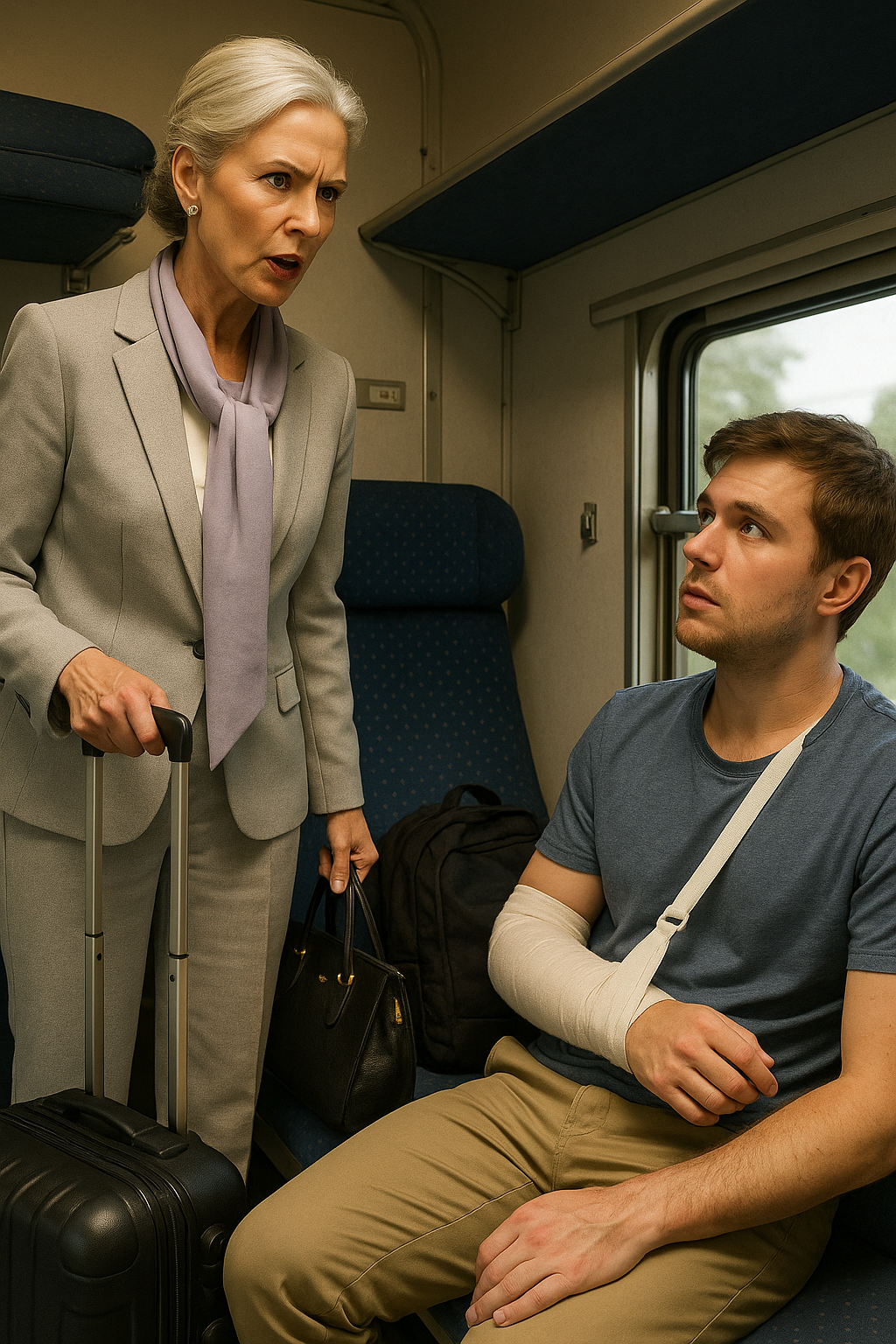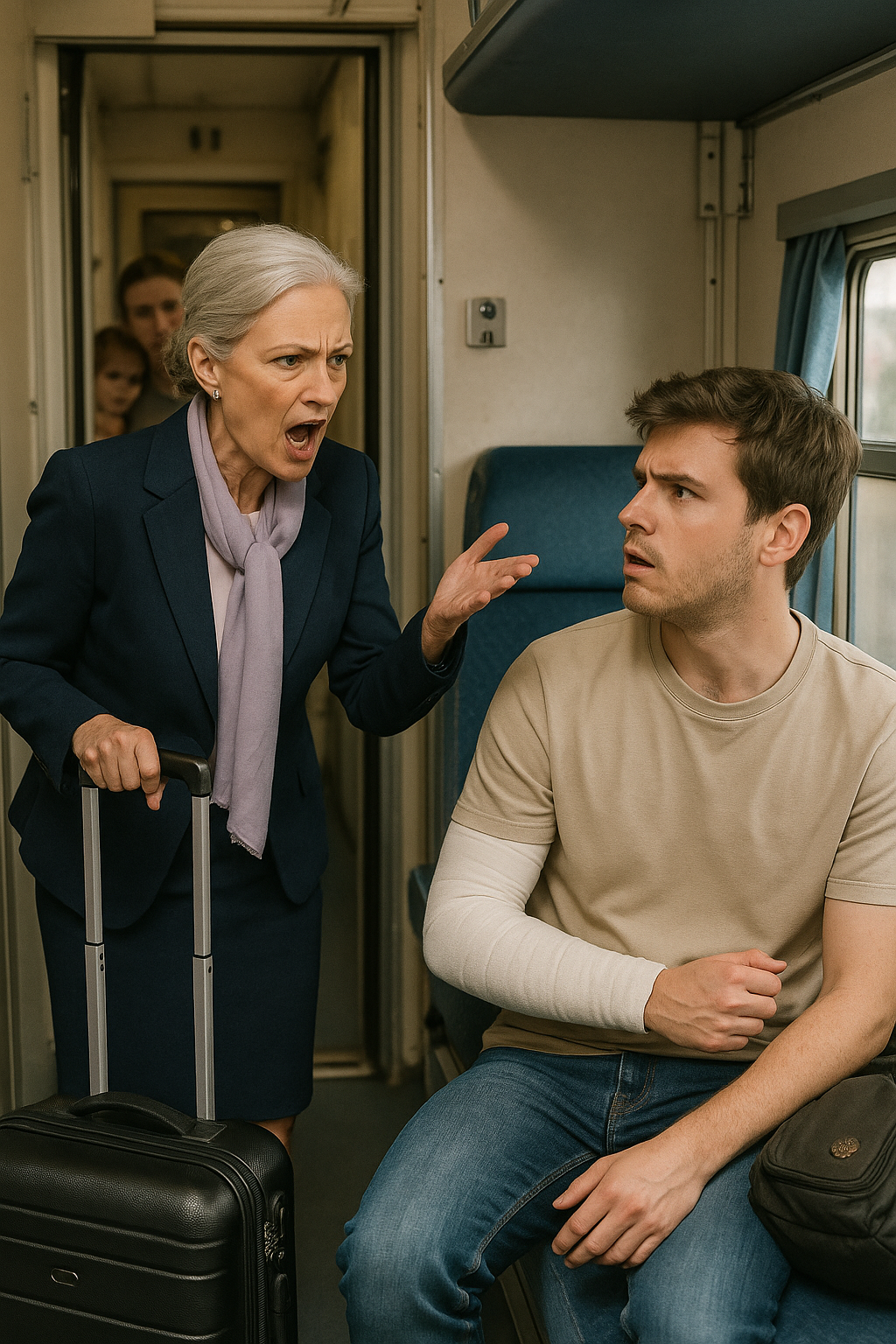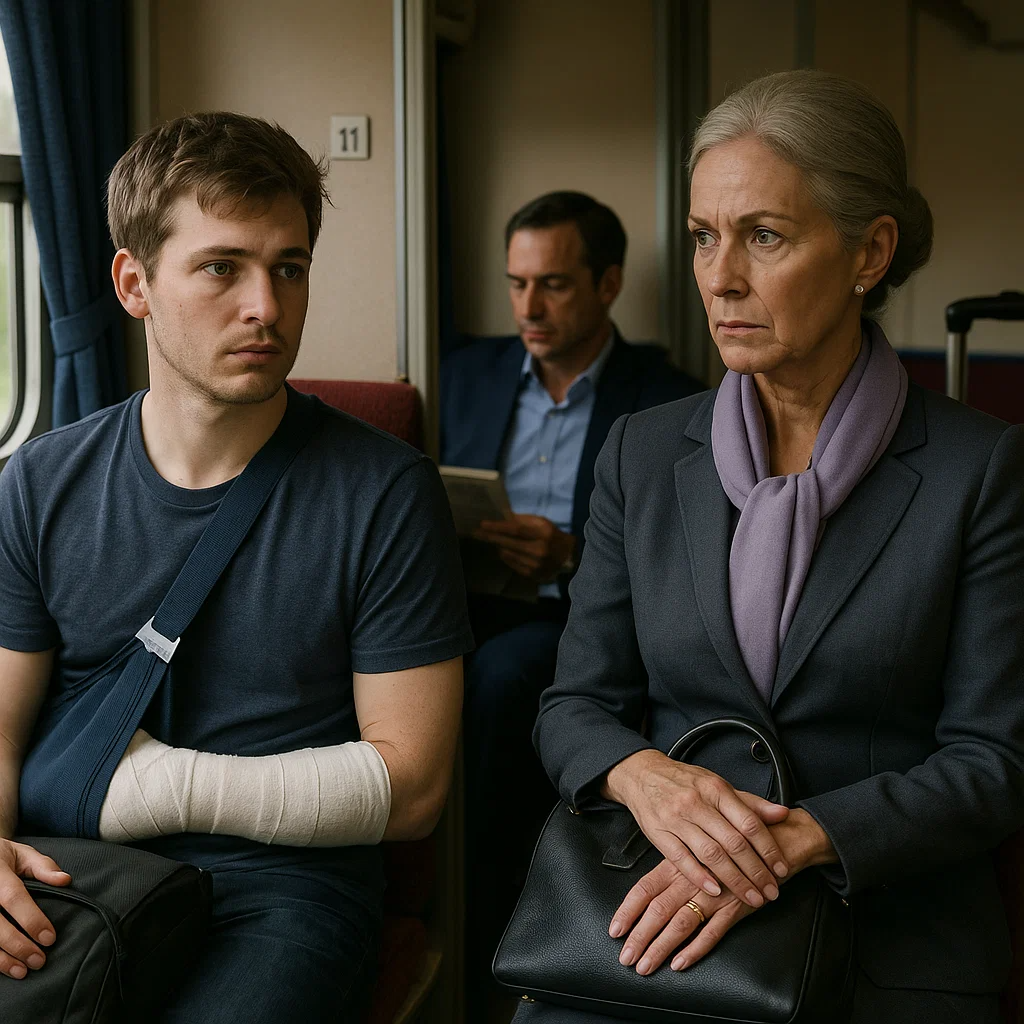Three days after a brutal fall on a flight of stairs, Daniel boarded the 6:45 evening train bound for Brookhaven, a quiet town nestled just outside the city’s bustle. His left arm was tightly wrapped in a white plaster cast, elevated slightly across his chest in a sling. The orthopedic doctor had called it a “clean break,” as if there was such a thing.
To Daniel, nothing about it felt clean—the bone had snapped like a twig, the pain was constant despite the medication, and every movement reminded him just how much we take for granted when both arms work.

More than the pain, it was the helplessness that weighed on him. Struggling to button a shirt with one hand. Watching someone else tie his shoelaces. Having to ask a stranger to lift his backpack onto the train.
But at least now, he was on his way to somewhere safe—his parents’ house. A place with hot soup, warm blankets, and zero expectations. He had paid a little extra to reserve a lower berth, knowing well that the upper one was out of the question with his arm in this state.
The platform buzzed with voices and rolling suitcases as the train hissed and lurched forward. Daniel, already in his spot, let out a soft sigh of relief. His backpack rested beside him, his sling secured, and his head leaned gently against the window. The hum of the train on the tracks offered a sort of lullaby—a promise of quiet.

Until she arrived.
She stepped into the compartment like she owned it.
Tall, elegantly dressed, and perhaps in her early fifties, the woman exuded confidence that bordered on entitlement. A crisp lavender scarf matched her carefully pressed suit. Her silver hair was pulled into a pristine chignon, and her makeup was flawless. She dragged a compact roller bag with one hand while the other clutched a leather purse stamped with a small golden emblem.
Daniel looked up out of courtesy and gave a polite nod. She didn’t return it.
Instead, her eyes scanned the small compartment like a queen inspecting her court. They landed on Daniel. Then on the ticket pinned beside the berth number. Then back at him.
“Young man,” she said without greeting, “I always take the lower berth. Kindly move.”

There was no ‘please,’ no hint of suggestion in her tone. It was a command.
Daniel sat up slightly, blinking. He shifted the weight of his cast for her to see.
“I’m sorry, ma’am,” he said gently, “but I have a fractured arm. I specifically booked the lower berth for that reason. I really can’t climb up.”
She didn’t even glance at the cast.
“Unbelievable!” she snapped, loud enough for people passing in the corridor to hear. “What kind of upbringing do young people have these days? You see a lady of my age, and you still sprawl out like a king!”
Daniel opened his mouth to respond, but her voice only grew louder.
“Where is your shame? Your manners? What are you learning in school—selfishness?”
A few curious faces now peeked into the compartment. A mother with a toddler. A college student with earbuds halfway out. All drawn in by the noise.

Daniel remained calm, though his heart pounded. Confrontation was never his strong suit.
Then he noticed something else.
A man—tall, early forties, stylish in a navy blazer—entered right behind the woman and quietly slid into the opposite seat. He had sharp features, wore a designer watch, and held a copy of The Financial Times under one arm. The woman’s tone shifted slightly as she noticed him. She gestured grandly with one hand and sighed with affected despair.
“Young people have no empathy,” she continued, her voice now rich with performance. “None! We give them everything, and they can’t even offer a seat to someone older.”
Daniel suddenly understood.
This wasn’t just about a berth. This was theater.
She was performing—for the man.

From the way her eyes flicked toward him, the way she smoothed her scarf and adjusted her posture, it was clear. She wanted to appear righteous, victimized, and important—all to earn the man’s admiration.
Daniel stayed silent. Pain throbbed beneath the cast, but more than that, a quiet fire stirred in his chest. Not anger. Not even embarrassment. Something else.
Awareness.
He watched as she, failing to guilt him into giving up the seat, dramatically settled into the seat across from the man. Her frustration vanished instantly. In its place bloomed a bright, flirty smile.
“Oh, that’s a lovely watch,” she said, leaning slightly toward him. “Swiss-made?”
He gave a polite nod.
“Always tells the truth,” she giggled, tossing her silver hair back. “Not like people these days.”
Daniel turned to the window, trying to block them out. But he couldn’t help overhearing the giggles and syrupy compliments.
How quickly the storm had become sunshine.
But then, a thought came to him.
He could confront her. He could argue back. Or… he could show everyone what had just happened—with calm, undeniable proof.
Daniel quietly reached into his backpack and retrieved his phone. He opened the voice memo app and hit record.

Then he turned back toward her.
“Ma’am,” he said, his tone calm but firm, “I’ve recorded your outburst. Everything. Your insistence that I give up a seat I paid for because of a broken arm. Your refusal to acknowledge a medical condition.”
Her laugh froze. Her hand, mid-gesture, dropped to her lap.
“I also noticed your purse,” he continued, pointing gently. “It has a badge. ‘Ministry of Education,’ right?”
Her expression changed instantly. All color drained from her face.
“You’re… you’re misunderstanding…” she stammered, suddenly meek.
“No,” Daniel said, still calm. “I understand perfectly. You tried to humiliate someone publicly—someone injured—just to impress a stranger.”
The man beside her shifted in his seat. His eyes darted between Daniel and the woman. His posture stiffened.
Daniel continued. “Imagine what your colleagues would think if they saw this recording. How you used your position to intimidate someone. Harassed a passenger on a medical basis. All in public.”
“I didn’t mean— It was just a miscommunication,” she said weakly.
“No, ma’am,” Daniel replied. “You meant it. And I hope next time you think twice before trying to manipulate or shame someone into submission.”
He ended the recording and slipped his phone back into his bag.
The man next to her now leaned slightly away. Whatever curiosity he’d had was gone. His gaze returned to his newspaper, and he crossed his legs, turning slightly toward the window.
The woman said nothing else.
Not for the next four hours of the ride.

She didn’t giggle again. No loud declarations, no righteous indignation. Her energy had vanished, folded into herself like a deflated balloon.
Daniel returned to his own world, turning his face toward the twilight sky outside. The sun dipped low, bathing the trees in amber light as the countryside passed by like a dream.
The pain was still there—a dull throb beneath the cast—but inside, something had shifted.
He felt grounded. Whole. Even with one arm.
There was no need to raise his voice. No need for name-calling. Just truth. Just clarity.
When the train finally rolled into Brookhaven station, Daniel stood carefully, gripping his bag with one hand. A kind older man helped him lift it down from the overhead rack.
“Take care of that arm, son,” the man said with a smile.
“Thank you,” Daniel replied.
As he stepped off the train, he noticed the woman lingering behind, eyes cast downward, avoiding all eye contact. The man she had tried so hard to impress was already halfway down the platform, walking briskly in the other direction.
Daniel didn’t look back again.
His parents were waiting at the station gate. His mother wrapped him in a careful hug. His father gave a gentle pat on the back.
“How was the ride?” they asked.
“Quiet,” Daniel said with a small smile. “And… unexpectedly enlightening.”

A few days later, Daniel shared the story in a blog post—not to shame the woman, not to go viral, but to speak about something deeper.
“You don’t need full strength to stand your ground,” he wrote. “Sometimes all you need is truth. Delivered quietly.”
The post gained traction, shared by those who had faced similar situations—young people dismissed for their age, passengers judged without context, people forced to shrink themselves in the face of loud entitlement.
One comment stood out.
“I was on that train. I heard everything. I wish I had spoken up. Thank you for handling it the way you did.”
Another read:
“You didn’t just teach her a lesson—you reminded the rest of us that we’re allowed to say no with dignity. That our voices matter even when we whisper.”
And Daniel?
He healed slowly. His arm, his confidence, and his trust in quiet strength—all recovered.
Not everything in life needs a fight.
Sometimes, the calmest response carries the loudest echo.


